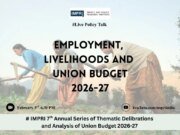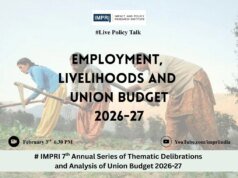Policy Update
Anamta Husain
Background:
The Free Coaching for SCs, OBCs, and beneficiaries of the PM CARES Children Scheme is an initiative taken by the Ministry of Social Justice & Empowerment, Government of India. The scheme aims to provide high-quality coaching to Scheduled Castes (SCs), Other Backward Classes (OBCs), and beneficiaries of the PM CARES Children scheme, who were included from 2024-25. These groups often face systemic inequalities and exclusion that hinder their access to educational resources.
The idea behind this initiative (Free coaching) is to enable students from these groups to appear in various competitive exams that serve as gateways to securing suitable employment in both the public and private sectors and obtaining admission in prestigious professional and technical higher education institutions. The scheme also includes eligibility examinations such as TOEFL and IELTS, which are often needed for language requirements in applications to foreign universities.
Function of the Scheme:
A total of 3,500 students will be selected annually under this scheme (Free Coaching). 70 per cent of the seats will be allocated to SC students, while 30 per cent will be reserved for OBC students. Furthermore, 30 per cent of the total seats in every category will be reserved for female candidates. Every university shall admit a maximum of 100 students, excluding those under beneficiaries of the PM Cares Scheme.
All eligible and willing candidates under PM Cares will be allocated seats over and above the 100 allocated seats. The implementing agency for the scheme is Dr Ambedkar Foundation, along with selected Central Universities included in its panel. The coaching centres run by these universities will be called the Dr. Ambedkar Centre of Excellence.
The courses for which coaching will be organized are:
- Group A and B exams held by the Union Public Service Commission (UPSC), the Staff Selection Commission (SSC), and the different Railway Recruitment Boards (RRBs)
- Group A and B exams held by the State Public Service Commissions
- Officers’ Grade recruitment exams organized by Banks, Insurance Companies and Public Sector Undertakings (PSUs)
- Leading entrance examinations for admissions to a) Engineering (IIT-JEE), b) Medicine (eg. NEET), c) Professional programs including Management (eg, CAT), Law (eg, CLAT), and d) other disciplines decided by the Ministry periodically.
- Eligibility exams such as TOEFL, SAT, IELTS, GRE, and GMAT
- Entrance exams for CPL (Commercial Pilot License) Courses, National Defence Academy (NDA), and Combined Defense Services (CDS)
Impact of the Scheme:
- Accountability Mechanism:
- All coaching institutions will maintain biometric attendance records that ensure regular attendance of the students.
- They will also be required to submit a monthly progress report, which would allow real-time insights into the performance of students and the effectiveness of the institutions in preparing them.
- The government will also establish an Online Learning Management System, which would allow consistent monitoring of institutions across the country, facilitating data collection and analysis across all participating universities.
- Stipend for Candidates: All students will be paid a monthly stipend of Rs. 4000 up to 12 months for their expenses. For supporting candidates who clear the mains stage of Civil Service and State Services exams, considered to be highly competitive, an additional Rs. 15,000 will be provided to them for preparations for the interview stage.
- Diversity of Courses: Each participating institution will be required to offer no more than 4 courses, ensuring that students have diverse options to choose from.
- Inclusion of Eligibility Courses: Courses such as SAT, TOEFL, and IELTS are a prerequisite for students planning to apply for undergraduate or master’s study abroad. Providing coaching in these tests will help bridge the gap between students’ accessible resources and aspirations.
- Resource Utilization: The Learning Management System (LMS) will also be used to upload online and offline lectures recorded by the faculty. They will be available for students enrolled in the scheme under other Central Universities.
This mechanism will promote cross-university collaboration, quality check, increase equity by connecting all universities together on the same platform, and self-paced learning.
Challenges and Issues:
The scheme currently does not employ a mechanism to track the progress of students after the coaching and entrance examinations. This is crucial to locate various factors that might hinder students from pursuing their trajectory forward. For instance, although eligibility test preparations such as the GRE, IELTS, and SAT are a valuable addition to the scheme, there can be close monitoring of other resources required in the process of university admissions.
The preparatory tests are mostly for foreign university applications, which often have several components in the admission process. These exams may have hefty fees, and the universities often take into account several elements, such as extracurricular activities, academic achievements, and other holistic requirements, which can be challenging for students from disadvantaged backgrounds to demonstrate. Furthermore, bridging resources and awareness about studying abroad is crucial to make sure that students have a clear path for their academic pursuits.
Way Forward:
The scheme is a good initiative towards increasing the accessibility of coaching programs for students from underprivileged backgrounds. The initiative can be enhanced further by focusing on post-coaching analysis of students’ performances and professional or academic trajectory. This would allow insights into other challenges and obstacles that might hinder students from pursuing their aspirations. In conclusion, Free Coaching for SCs, OBCs, and beneficiaries of the PM CARES Children Scheme is a good start to promote educational accessibility.
References:
Justice, Social. “Free Coaching for SCs, OBCs and Beneficiaries of PM CARES Children Scheme | Department of Social Justice and Empowerment – Government of India.” Socialjustice.gov.in, 2024, socialjustice.gov.in/schemes/30. Accessed 18 July 2025.
PTI. “Government Extends Free Coaching Scheme to PM CARES Beneficiaries.” The Hindu, 21 Feb. 2025, www.thehindu.com/education/pm-cares-beneficiaries-sc-obc-students-to-get-free-coaching-for-competitive-exams/article69245900.ece#goog_rewarded. Accessed 18 July 2025.
About the author:
Anamta Husain is a Research Intern at IMPRI, New Delhi. She is currently pursuing her bachelor’s in political science from Ashoka University, Sonipat.
Acknowledgement:
The author extends her sincere gratitude to the IMPRI team and Ms. Aasthaba Jadeja for her invaluable guidance throughout the process.
Disclaimer:
All views expressed in the article belong solely to the author and not necessarily to the organisation.
Read more at IMPRI
Technology Development for Indian Languages (TDIL), 1991
Rethinking Groundwater Management in India: A Policy Update on Atal Bhujal Yojana, 2020



















